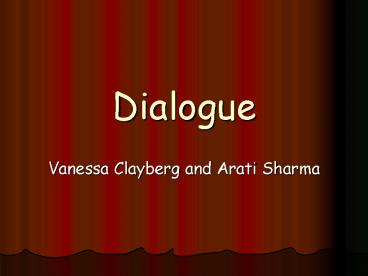Dialogue - PowerPoint PPT Presentation
1 / 10
Title:
Dialogue
Description:
Dialogue Vanessa Clayberg and Arati Sharma – PowerPoint PPT presentation
Number of Views:151
Avg rating:3.0/5.0
Title: Dialogue
1
Dialogue
- Vanessa Clayberg and Arati Sharma
2
Verisimilitude
- Verisimilitude means having a resemblance the
truth. - Authors use verisimilitude to add a sense of
truthfulness to their writing by using real-life
elements and details in their stories. - Example of Verisimilitude
- If a teenager wanted to lie to his or her parents
about where they were last night, they could make
up an elaborate story placing them at a friends
house instead of at a wild party. To make the
story more believable, the teenager could add
details about their all-night study session or a
movie that they had watched. These details make
the story seem more credible, thus giving it
verisimilitude.
3
Speech Headings
- Speech headings are descriptions of a characters
vocal tones or gestures as they speak a line from
a play. - Speech headings often come before dialogue tell
the speaker what emotion they should attribute to
the line. - Examples of Speech Headings
- Jack (irritably) Give me back my pen!
- Susan (pointing to the table) I left my purse
there before I rushed to open the door.
4
Stage Directions
- These are notes added to the script of a play to
convey information about its performance not
already explicit in the dialogue. - They are all relative to the position of an actor
facing the audienceright and left are therefore
reversed from the spectators' point of view.
5
Examples of Stage Directions
- Example 1
- An excerpt from Shakespeares Romeo and Juliet
ACT I, Scene 1 - Verona. A public place.
- Enter SAMPSON and GREGORY, of the house of
Capulet, with swords and bucklers (shields). - Example 2
- An excerpt from Julius Cesar, SCENE 2
- A public place.
- Enter CAESAR, ANTONY (dressed for the race),
CALPHURNIA, PORTIA, DECIUS, CICERO, BRUTUS,
CASSIUS, CASCA, a SOOTHSAYER after them,
MARULLUS and FLAVIUS.
6
Direct and Indirect Discourse
- Direct discourse is a report of the exact words
used in a dialogue and is usually marked by
quotation marks. - Example of Direct Discourse
- He said, I am tired and going home.
- Philip said, "I'll come if I have the time."
- Indirect discourse consists of reporting such
statements indirectly, or without the usage of
quotation marks. - This is when a third person narrator summarizes
the words of a character but replicates his or
her characteristic idioms and patterns of
thought. - Example of Indirect Discourse
- He said that he was tired and going home.
- Philip assured them that he would come if he had
the time.
7
Repartee
- Repartee is a quick-witted remark used in
conversation. - Repartee is often used to show a characters wit
and usually adds humor to a more serious
situation. - Example of Repartee
- At a 1912 dinner party, Lady Astor became
annoyed at an inebriated Churchill, who was
pontificating on some topic. Reaching the end of
her patience, she blurted out, Winston, if you
were my husband, I'd put poison in your coffee.
Churchill famously replied Nancy, if you were
my wife, I'd drink it. Viva La Repartee, Dr.
Mardy Grothe
8
Soliloquy
- A speech given by a character from a play to
relay his or her thoughts aloud to the audience
and themselves. - A soliloquy is given when no other character is
present on stage, and can give the audience
insight into a characters feelings or actions. - Examples of Soliloquies
- The To Be or Not To Be soliloquy from
Shakespeares Hamlet. This is thought to be the
most famous soliloquy. - Iagos Thus do I ever make my fool my purse
speech from Shakespeares Othello.
9
Aside
- Aside is a quick remark made by a character that
typically embodies a thought out loud about their
present situation. - An aside is said in the accompaniment of others
on stage, but is meant only to be heard by the
audience, the speaker, and the person the remark
was made to (if any). - Example of Aside from Romeo and Juliet
- Juliet Or, if thou wilt not, be but sworn my
love, and I'll no longer be a Capulet.Romeo
(Aside) Shall I hear more, or shall I speak at
this?Juliet 'Tis but thy name that is my enemy.
Thou art thyself, though not a Montague"
10
- Fin.































